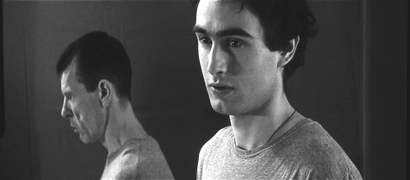Russians bring their tepid gloom to France
Like the recent Australian Western “The Proposition,” “13 Tzameti” only comes alive when its characters are shooting each other. Fortunately for the audience’s chances of staying awake, a Russian roulette sequence takes up about a third of its running time. But unlike the gory “Proposition,” “13 Tzameti” is relatively bloodless, even if its violence is far from painless. In between holding guns at each other?s heads, the players get so anxious that most resort to morphine injections in order to calm down and keep going.
Before the games begin, “13 Tzameti” plods along with a sense of portent but little suspense, and its tension dissipates after they end.
No wonder that Palm Pictures’ trailer, which has played frequently at Film Forum over the past month, consists of the first Russian roulette scene, taken completely out of context. As a stand-alone set piece, it’s powerful stuff; it may work well as an ad for the film. However, it’s a terrible introduction to it, as it makes clear exactly what the mysteries of its first third are building towards. Even if I hadn’t seen the trailer beforehand, I suspect that “13 Tzameti” would still look like an elaborate pretext for the Russian roulette sequence. Babluani could have built an impressive 45-minute film from his material, but he seems as bored by its opening and closing reels as I was. He takes most of its length to find a rhythm—its first third is painfully slow and tedious.
Sebastian (Georges Babluani, the director) lives in poverty with his Georgian immigrant family. He struggles to support them. Working on a neighbor’s roof, his luck changes when the man succumbs to his drug habit. He overhears talk about a package that could make the household wealthy. Finding an envelope with a train ticket inside, he heads to Paris to follow up on it, taking on his dead neighbor’s identity. Eventually, he finds his destination in the countryside—a building where a group of gamblers are betting on the outcome of a Russian roulette game. At first, the players have one bullet in their gun; then, the survivors of that round place use two bullets in the next one, as the game builds towards a duel between the survivors. Desperate for money, Sebastian becomes player 13.
I’m not sure whether Babluani or his casting director—whose name isn’t listed in the film’s press kit—deserves the credit, but “13 Tzameti” is filled with craggy, lived-in faces. While Georges Babluani is conventionally—and blandly—handsome, the rest of the cast is unshaven and wrinkly. He’s scored a real coup by casting Aurélien Recoing as Jacky, Sebastian’s final competitor. Recoing is best known in the U.S. for his role in Laurent Cantet’s masterful 2001 “Time Out,” in which he played a businessman who carried on a charade of going to work every day even though he had been fired. That character was so fragile that unemployment damn near ruined his life, but Jacky is a shaven-headed thug who keeps his cool even with a gun to his head. Recoing delivers a physical menace absent from his previous parts, even though there’s little character development in “13 Tzameti.”
Originally from Georgia, Babluani made “13 Tzameti” in France. Although there’s more than a hint of post-Soviet gloom and angst to his film, it never goes anywhere with the material. Similarly, its treatment of Paris—devoid of glamour, it’s a way station to hell in the provinces—suggests a subversion of cinematic clichés about the city but doesn’t do more than hint at it. When it’s least like a thriller, “13 Tzameti” is also at its least compelling. Working-class life only interests Babluani as the mechanism to put his narrative into motion.
“13 Tzameti” has been called a neo-noir, but it’s a lazy variation on the form. For real moral stakes, there has to be a sense that Sebastian has a soul to lose. While he’s a nice enough guy, the film never establishes much of his personality, relying instead on admittedly pretty black and white cinematography. The narrative is powered by a mood of secondhand gloom, which feels more like a fashionable pose than a reflection of real despair. “13 Tzameti” is the kind of film that gets called a triumph of style over substance, but it doesn’t even have that much style going for it.
gaycitynews.com

































